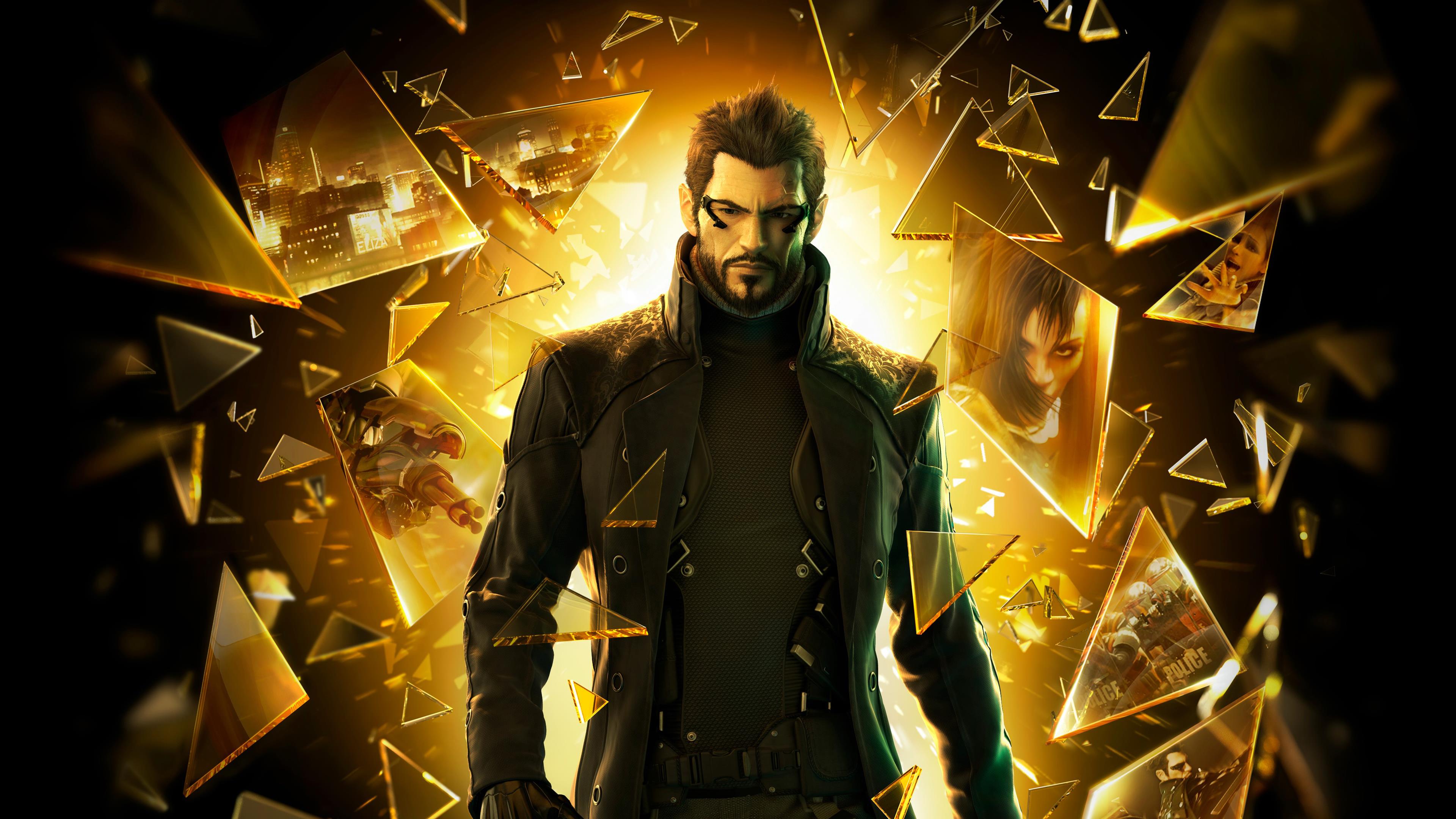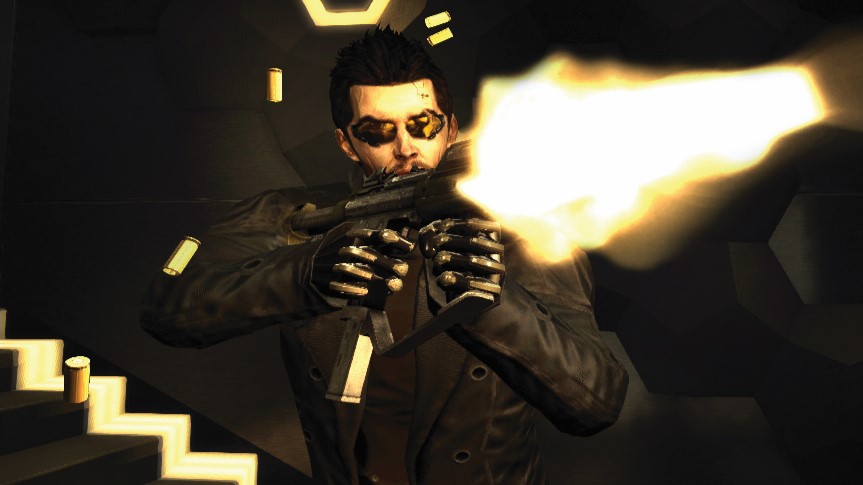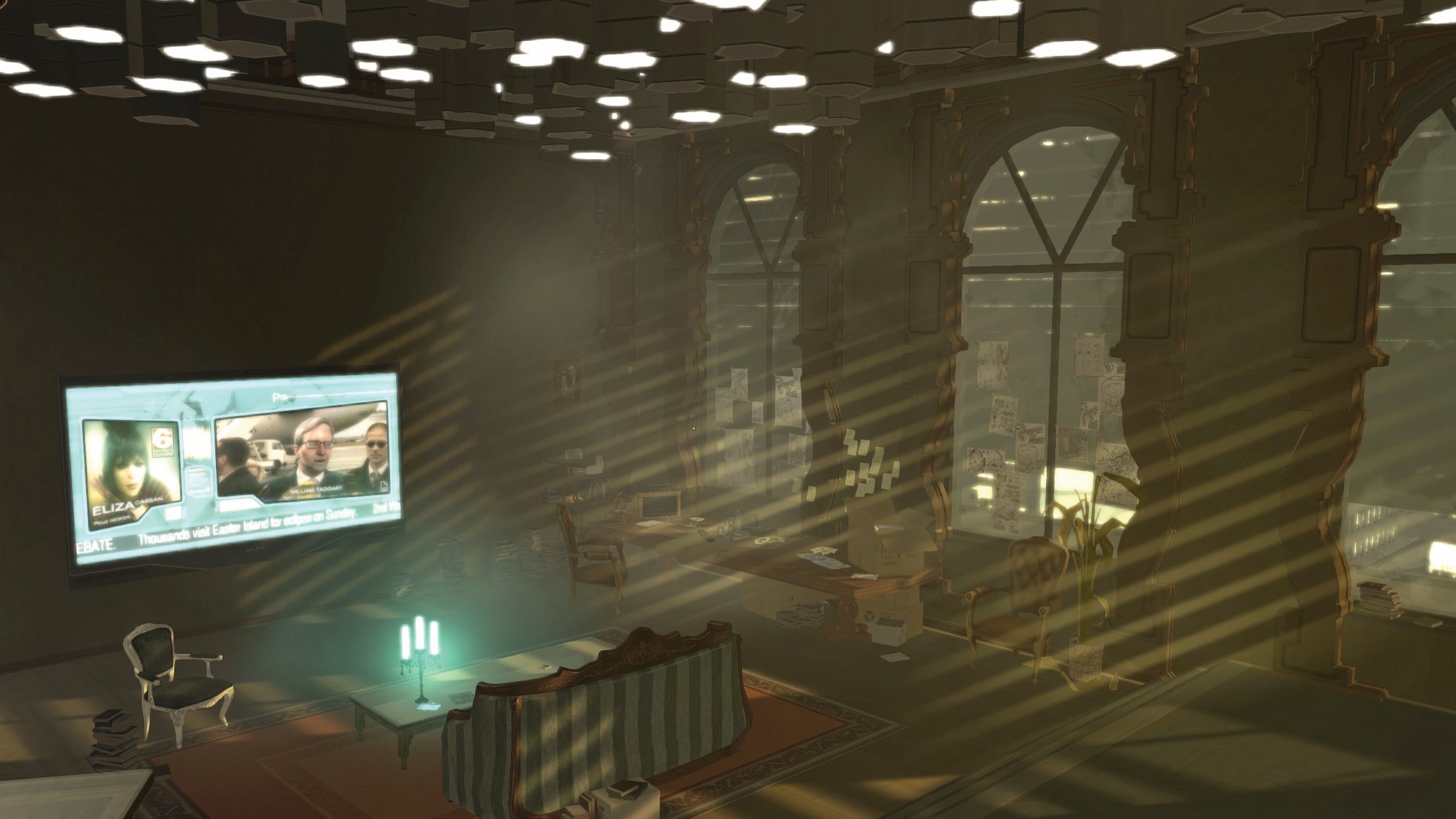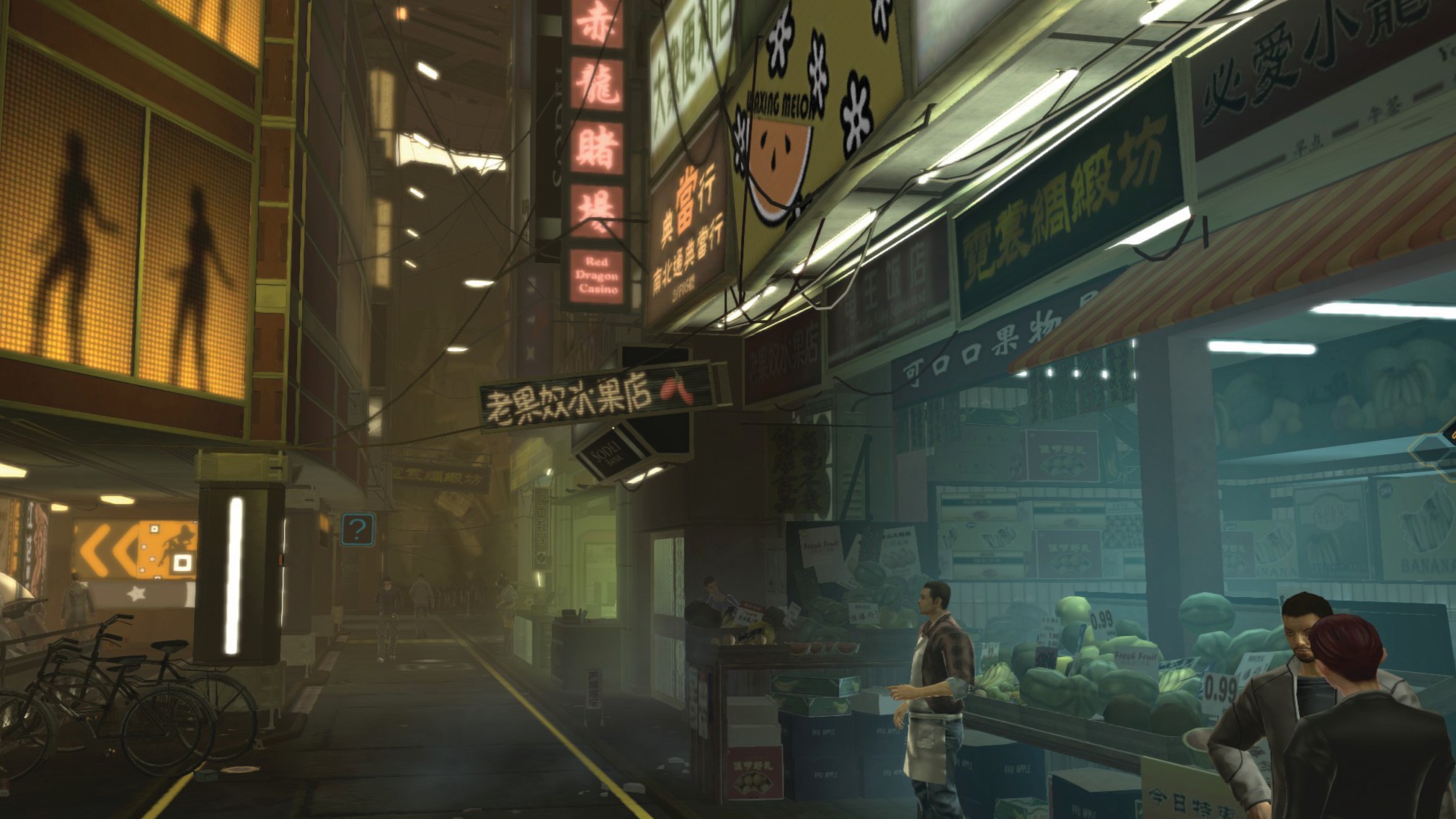Deus Ex: Human Revolution's flawless gameplay has aged better than its goofy vision of a future obsessed with robot arms
"The next step in human evolution".

This article first appeared in PC Gamer magazine issue 387 in August 2023, as part of our Reinstall series. Every month we load up a beloved classic—and find out whether it holds up to our modern gaming sensibilities.
As a strongly self-selecting PC gamer, there have been times in my life I've tried to convince myself I didn't like something because it wasn't 'hardcore' or PC enough. For almost a year in high school, I pretended to not like BioWare games—to no one else in particular, just in my own mind palace—because I watched a loud man on YouTube say they were quite bad indeed.
So too, more recently, with the Deus Ex series. I played the hell out of Human Revolution, Eidos Montreal's 2011 prequel/reboot, in high school. I must have rolled credits on it at least twice before ever making it past the halfway point in the OG classic, and yet for a long time I think I'd subconsciously talked myself into looking down my nose at it: too dumbed down, too different. Give me Deus Ex? Yeah, that means Dentons and GEP Guns, I never asked for Jensens or explosive revolvers!
I was definitely still feeling that trepidation when I reinstalled the Director's Cut of Human Revolution on my Steam Deck and loaded into its opening sequence. Pre-robotarms protagonist, Adam Jensen, is preparing to go with his ex-girlfriend and current coworker (yikes, that's a bit awkward isn't it?!) on a trip to Washington DC for her to present revolutionary new research on robot arms. Spoilers for a 12-year-old game to follow, but Megan is actually the worst girlfriend in history and has performed indeterminate, surreptitious human experiments on Adam, who in addition to being an ex-SWAT guy who refused to shoot a teenager when ordered to, is also a very special boy, implied to have been grown in a lab, who can take on robot arms and other, assorted augmentations or 'augs' without rejecting them and needing a drip feed of drugs to cope like most of the population.
By the way, those robot arms are like, a super big deal and one of the driving forces of the world economy now. Jensen's boss, David Sarif, thinks robot arms are "the next step in human evolution", Jensen's kinda meh either way and just really down bad for his ex, and Megan's like, super guilty, but not enough to let it impact her career or anything. Anyway, I get a Welcome to Black Mesa-style walkthrough of Sarif's facilities where it's revealed to be a more homey, mom-and-pop supplier of armaments to the US Department of Defense than other robot arm manufacturers like the cartoonishly villainous Tai Yong Medical. Then Human Revolution's diet Foxhound, The Tyrants, show up, kill Megan (yeah, right), and mess up Jensen bad.
Off the leash

Up till now? So far, so Xbox 360. I got a scruffy ex-military/law enforcement protagonist and his equally boring girlfriend, lightly interactive first-person cutscene, and some stop and pop cover shooting. I was wondering just what I loved so much about this game the first time, and then I made it through all the introductory cutscenes into the first mission.
It's six months after the attack and anti-aug extremists (they're correct!) have broken into David Sarif's main factory to uncover all his dirty laundry, and I'm supposed to go in, rescue the hostages (maybe) and secure any compromising data (definitely). Here, Human Revolution gets to one of the Deus Ex series' main selling points: some kind of office or other assorted workplace, after dark, chock full of armed guys to knock out and hide in vents, peoples' emails to read, and hidden paths to take.
The ambition and open endedness of games like Deus Ex or System Shock 2 is something I'll defend to the day I die.
I was hooked—I didn't even mind that I missed the hostages partway through and had to redo half the level to save them. One of the big things that's hitting me about jumping right into Human Revolution after a playthrough of Deus Ex is how good Human Revolution feels. Rough edges grip me, and the ambition and open endedness of games like Deus Ex or System Shock 2 is something I'll defend to the day I die, but the way Human Revolution presents a more consistent, smooth, approachable stealth game in wide open levels reminiscent of the original was an absolute masterstroke.
Keep up to date with the most important stories and the best deals, as picked by the PC Gamer team.
Look at the stealth takedowns, for instance. In the original Deus Ex, non-lethal knockouts are best achieved by tapping someone with the riot prod once to stun them, then either prodding them again, wasting valuable ammunition, or by switching to the police baton and smacking the enemy precisely in the midsection. Anything else, and they start yelling for help and shooting at you. If I upgrade my Low Tech weapon skill all the way, I can knock some enemies unconscious outright with just the baton sometimes, while high-level enemies like MJ-12 Commandos will ignore my riot prod about 50% of the time.
In Human Revolution I tap the takedown button and watch a fun little cutscene of Adam Jensen going full John Wick mode at whoever I'm looking at, with this ability only limited by a clear resource, my little aug batteries. That consistency extends to detection: in the original game, I find I can crouch walk mere feet in front of certain enemies without being detected, while in other instances I've had bullets start flying at me from halfway across a map because of a guard I could barely even make out. Meanwhile, Human Revolution's guards always behave fairly reliably, and I quickly got used to the limits of their vision. There's a place for both approaches, I think, but Human Revolution's take on a stealth-focused immersive sim isn't dumbed down, it just goes down smoother, and I can always be secure in the knowledge that an enemy alert was my fault.
Hub bub

Human Revolution comes even more alive with its non-combat zones, and this is definitely an area of genuine iteration on the original game. Detroit and Hengsha are just as complicated as Hong Kong or Paris from Deus Ex, chock full of sidequests, optional encounters and weirdos' apartments you can just break into and watch TV in. Human Revolution then benefits from the multi-generational leap in graphics technology, with so many of its interiors just feeling cluttered, characterful, and lived-in. A fantastic game to hang out in and explore.
I spent a solid hour and a half or so just bumming around Sarif HQ after that first mission. There's almost a dozen offices with emails to read and goodies to purloin, while at this point in the game I can only brute force hack the doors to a handful of them. Most, however, have their codes squirrelled away somewhere in the building, and I felt like I was untying this tightly wound knot as I opened up more and more offices, hoovering up goodies and snooping on emails to get a sense of what this place is like during the day.
Augmented reality

I'm getting more comfortable with just loving Human Revolution's gameplay, characters, and vibe while also asserting my truth: this game is dumb as hell, man. The original Deus Ex is ten years older and has a vision of the future that remains gripping and prophetic—I think that game is more than due a Metal Gear Solid 2-style reappraisal as a genuinely great work of sci-fi.
In Deus Ex, all the goofiness around '90s conspiracies—greys, mole men, and the like—belies a razor sharp, cynical view of the coming century. The pursuit of profit and power has become decoupled from production and good governance, leaving society spiralling in the face of myriad crises like a mysterious plague, economic collapse, and climate change. The government can only punish its citizens and wage war, not proactively solve any of its issues. Weirdly, however, no one treats it like the end of the world. Everyone goes to their jobs, reads the paper, hopes for things to get better as the situation degrades, the fever never seeming to break. Does any of this sound familiar?
What if everything revolved around robot arms?
Joshua Wolens
Human Revolution, meanwhile, boldly asks, "What if everything revolved around robot arms?" My colleague, Joshua Wolens, pointed out to me how much it feels like Eidos Montreal just hyper fixated on the original game's tertiary concern around augmented agents. As we approach Human Revolution's setting date of 2027 with dizzying speed, it starts to feel more like a Falloutesque, over the top, themed alternate reality than any kind of sober prediction or pointed reflection of our own times. Human Revolution's very self-serious presentation covers up what I've found to be supremely goofy science fiction conceits.
Compare all the human augmentation stuff to real-life cosmetic surgery or AI concerns and it's almost laughable: of course this crap should be regulated, man! In-game though, the anti-aug movement is coded as this dorky, retrograde 'mothers against videogame violence' deal, before getting upgraded to weird, sort of sci-fi racists in the sequel. Anti-aug leader Bill Taggart smacks of some kind of Moral Majority lickspittle opportunist, while the whole movement has been astroturfed by the Illuminati to… do something? I guess they want to control 'human evolution' as David Sarif has dubbed chopping off a guy's arms and legs to give him robo strength.
But you know what? I've come to love it the way I do a JRPG plot. Human Revolution is goofy, fun sci-fi themed around robot arms and pining for your ex-girlfriend who did human experiments on you, as far removed from Deus Ex's sharp, thought-provoking sort of sci-fi as the Star Wars Expanded Universe (sorry, I meant Legends). There's room for both types of Deus Ex in my heart, and I think it's finally time for me to dig into Eidos Montreal's follow-up, Mankind Divided.
Ted has been thinking about PC games and bothering anyone who would listen with his thoughts on them ever since he booted up his sister's copy of Neverwinter Nights on the family computer. He is obsessed with all things CRPG and CRPG-adjacent, but has also covered esports, modding, and rare game collecting. When he's not playing or writing about games, you can find Ted lifting weights on his back porch.

